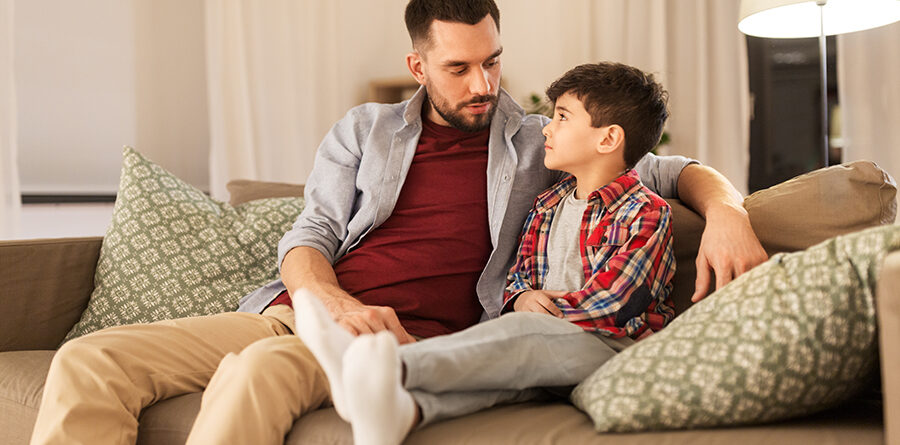With all of the uncertainty and ever-changing information surrounding COVID-19, it can be tough for parents to figure out how to discuss the issue with their children. In addition, you could be seeing behavioral effects as a result of their usual routine being disrupted, and from them picking up on added stress and anxiety. Children may be experiencing any of the following:
- Abnormal clinginess
- Difficulty with changes
- Changes in appetite
- Mood changes
- Increased attitude
It’s important during this particularly abnormal time to provide open communication with our little ones and make sure we’re asking them how they’re doing. In this post, we’ll dive into tips on how to talk to your kiddos about the virus that’s heavily impacting their lives.
Check in with yourself first.
Prep before you initiate conversations with your children. Check in with how
you’re feeling first to regulate your emotions surrounding the virus. Rochelle Anderson,
CTSS Lead Mental Health Practitioner at Nystrom & Associates, recommends a three-step process in a short video
here. Rochelle asks that you think, process, and plan. Think about what you want to say to your kids, process the amount of information you want to share (which could vary by age), and plan for talks about COVID-19.
Ask questions.
How much do they know about the virus? Chances are, it’s more than you’d expect. Find out what they already know. No matter the age, children listen and can pick up on anxiety and stress. Even if they can’t understand, they feel. Ask questions so you can get a good idea of what they already know and if it’s the correct information. If your child doesn’t seem interested in talking about it, it’s okay. Follow their lead.
Provide facts.
Explain what’s happening and let them know you’re there to answer any questions they have. Children can easily pick up on worry from parents or guardians, so be calm and reassuring. Use a comforting voice and try not to seem upset. If you don’t know the answer to one of their questions, say so. Use it as an opportunity to research the answer together. Refer to the
Centers for Disease Control and Prevention for up-to-date information.
It’s tough for children to understand a virus they can’t see. Use age-appropriate visual aids to help. Be aware of how they receive news and information. Minimize news consumption and point them to accurate, age-appropriate resources. Provide the context for certain news stories. They might be concerned over the death toll shown in the media. If they do ask about it, provide context by explaining percentages and how immune systems work to fight off viruses.
Be there for support and guidance.
Give them space to share their fears. It’s completely natural for kids to express fear or worry. They might be thinking, “Could I be next?” Let them know that kids don’t seem to get as sick as adults and that they can always come to you to talk about what scares them.
Children will feel like they are in control when they are armed with the proper information, so teach them about germs and proper hygiene. If they know that they can make a difference by washing their hands, it could assist with reducing anxiety.
Explain to them that being stressed out is okay. Sometimes there are stressful times in life, but eventually, things will return to normal. Refer to this helpful activity
here, explained by Bethany A. Gavic, a Licensed Independent Clinical Social Worker at Nystrom & Associates.
Maintain communication and routine.
Remain a source of guidance for your children and keep the conversation going. Ask questions like, “What do you think about these events?” Doing so will open up conversations and allow a safe space for them to continue to come to you as a resource.
Maintaining some predictability with a routine will help children cope with the changes in their life. Have the same bedtime, comforting meals, and read stories before bed. Having a routine will help make the transition easier when they do return to school.
Practice independence with activities they can do by themselves at home. They can take over certain chores, participate in simple yard work, work on crafting projects, puzzles, etc. Make time to be silly with them. Children need to see you having fun and being goofy, too. After all, laughter is the best medicine, right?
If you found this article helpful, like our
Facebook page so you can stay up to date with more tips like these!


